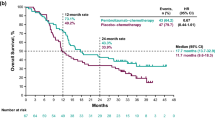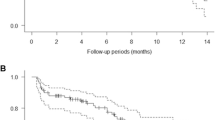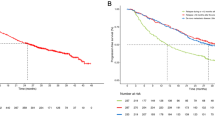Abstract
Introduction
Although various therapies are available for the treatment of metastatic colorectal cancer (mCRC), there is lack of head-to-head evidence. Recent studies have demonstrated the efficacy of chemotherapy in combination with different biological agents including regorafenib in second-line therapy in patients with mCRC. We conducted a network meta-analysis (NMA) to estimate the relative efficacy and safety of regorafenib in combination with chemotherapy compared to other biological agents with chemotherapy combinations.
Methods
A literature search was conducted in PubMed, Embase, and Cochrane databases to identify all randomized controlled trials (RCTs) evaluating the efficacy and safety of bevacizumab, regorafenib, panitumumab, cetuximab, ramucirumab, conatumumab, ganitumab, and aflibercept in combination with chemotherapy against chemotherapy alone as second-line setting from inception to 7 February 2019 in patients with mCRC. The survival outcomes were analyzed by the frequentist statistical approach (R software, netmeta package) while the level of individual treatment arms was assessed using the Bayesian method (R software, gemtc package).
Results
We identified 12 articles involving eight RCTs studies analyzing 6805 patients. The studies compared bevacizumab (3), regorafenib (1), panitumumab (2), cetuximab (3), ramucirumab (1), conatumumab (1), ganitumab (1), and aflibercept (1) against chemotherapy alone as comparator. The progression-free survival (PFS) revealed that regorafenib performed better than aflibercept (HR 0.9631, 95% CI 0.6785–1.367), ganitumab (HR 0.7228, 95% CI 0.3985–1.3109), panitumumab (HR 0.9653, 95% CI 0.6781–1.3742), and ramucirumab (HR 0.9206, 95% CI 0.6504–1.303). Regorafenib performed better than bevacizumab (OR 0.797, 95% CI 0.328–1.88) in terms of tumor response. Safety analysis showed that regorafenib performed better in reducing grade ≥ 3 adverse events (AE) than cetuximab and conatumumab, neutropenia than conatumumab, and fatigue than cetuximab.
Conclusions
Regorafenib combined with chemotherapy might be a potential alternative to conventional therapeutic options in second-line treatment of patients with metastatic colorectal cancer and could be considered as the best option for treating patients with KRAS and BRAF mutated mCRC. However future RCTs are needed to confirm these results.







Similar content being viewed by others
References
International Agency for Research on Cancer. Colorectal cancer fact sheet. https://gco.iarc.fr/today/data/factsheets/cancers/10_8_9-Colorectum-fact-sheet.pdf. Accessed Dec 26, 2019.
Cremolini C, Loupakis F, Antoniotti C, et al. FOLFOXIRI plus bevacizumab versus FOLFIRI plus bevacizumab as first-line treatment of patients with metastatic colorectal cancer: updated overall survival and molecular subgroup analyses of the open-label, phase 3 TRIBE study. Lancet Oncol. 2015;16:1306–15.
Venook AP, Niedzwiecki D, Lenz H-J, et al. Effect of first-line chemotherapy combined with cetuximab or bevacizumab on overall survival in patients with KRAS wild-type advanced or metastatic colorectal cancer: a randomized clinical trial. JAMA. 2017;317:2392–401.
Heinemann V, von Weikersthal LF, Decker T, et al. FOLFIRI plus cetuximab versus FOLFIRI plus bevacizumab as first-line treatment for patients with metastatic colorectal cancer (FIRE-3): a randomised, open-label, phase 3 trial. Lancet Oncol. 2014;15:1065–75.
Symonds LK, Cohen SA. Use of perioperative chemotherapy in colorectal cancer metastatic to the liver. Gastroenterol Rep (Oxf). 2019;7:301–11.
Ades S. Adjuvant chemotherapy for colon cancer in the elderly: moving from evidence to practice. Oncology (Williston Park). 2009;23:162–7.
Hurwitz H, Fehrenbacher L, Novotny W, et al. Bevacizumab plus irinotecan, fluorouracil, and leucovorin for metastatic colorectal cancer. N Engl J Med. 2004;350:2335–422.
Cunningham D, Humblet Y, Siena S, et al. Cetuximab monotherapy and cetuximab plus irinotecan in irinotecan-refractory metastatic colorectal cancer. N Engl J Med. 2004;351:337–45.
Herbst RS, Kurzrock R, Hong DS, et al. A first-in-human study of conatumumab in adult patients with advanced solid tumors. Clin Cancer Res. 2010;16:5883–911.
Takahari D, Yamada Y, Okita NT, et al. Relationships of insulin-like growth factor-1 receptor and epidermal growth factor receptor expression to clinical outcomes in patients with colorectal cancer. Oncology. 2009;76:42–8.
Metastatic Colorectal Cancer—ESMO. https://www.esmo.org/guidelines/gastrointestinal-cancers/metastatic-colorectal-cancer. Accessed Jun 18, 2020.
STIVARGA (regorafenib) tablets, for oral use. https://www.accessdata.fda.gov/drugsatfda_docs/label/2013/204369lbl.pdf. Accessed 2020 Jun 18, 2020.
Dhillon S. Regorafenib: a review in metastatic colorectal cancer. Drugs. 2018;78:1133–44.
Majithia N, Grothey A. Regorafenib in the treatment of colorectal cancer. Expert Opin Pharmacother. 2016;17:137–45.
Grothey A, Van Cutsem E, Sobrero A, et al. Regorafenib monotherapy for previously treated metastatic colorectal cancer (CORRECT): an international, multicentre, randomised, placebo-controlled, phase 3 trial. Lancet. 2013;381:303–12.
Li J, Qin S, Xu R, Yau TCC, et al. Regorafenib plus best supportive care versus placebo plus best supportive care in Asian patients with previously treated metastatic colorectal cancer (CONCUR): a randomised, double-blind, placebo-controlled, phase 3 trial. Lancet Oncol. 2015;16:619–29.
Bennouna J, Sastre J, Arnold D, et al. Continuation of bevacizumab after first progression in metastatic colorectal cancer (ML18147): a randomised phase 3 trial. Lancet Oncol. 2013;14:29–37.
Cao R, Zhang S, Ma D, Hu L. A multi-center randomized phase II clinical study of bevacizumab plus irinotecan, 5-fluorouracil, and leucovorin (FOLFIRI) compared with FOLFIRI alone as second-line treatment for Chinese patients with metastatic colorectal cancer. Med Oncol. 2015;32:325.
Masi G, Salvatore L, Boni L, et al. Continuation or reintroduction of bevacizumab beyond progression to first-line therapy in metastatic colorectal cancer: final results of the randomized BEBYP trial. Ann Oncol. 2015;26:724–30.
Sanoff HK, Goldberg RM, Ivanova A, et al. Multicenter, randomized, double-blind phase 2 trial of FOLFIRI with regorafenib or placebo as second-line therapy for metastatic colorectal cancer. Cancer. 2018;124:3118–266.
Peeters M, Oliner KS, Price TJ, et al. Analysis of KRAS/NRAS mutations in a phase III study of panitumumab with FOLFIRI compared with FOLFIRI alone as second-line treatment for metastatic colorectal cancer. Clin Cancer Res. 2015;21:5469–79.
Seymour MT, Brown SR, Middleton G, et al. Panitumumab and irinotecan versus irinotecan alone for patients with KRAS wild-type, fluorouracil-resistant advanced colorectal cancer (PICCOLO): a prospectively stratified randomised trial. Lancet Oncol. 2013;14:749–59.
Passardi A, Scarpi E, Gelsomino F, et al. Impact of second-line cetuximab-containing therapy in patients with KRAS wild-type metastatic colorectal cancer: results from the ITACa randomized clinical trial. Sci Rep. 2017;7:10426.
Ciardiello F, Normanno N, Martinelli E, et al. Cetuximab continuation after first progression in metastatic colorectal cancer (CAPRI-GOIM): a randomized phase II trial of FOLFOX plus cetuximab versus FOLFOX. Ann Oncol. 2016;27:1055–61.
Sobrero AF, Maurel J, Fehrenbacher L, et al. EPIC: phase III trial of cetuximab plus irinotecan after fluoropyrimidine and oxaliplatin failure in patients with metastatic colorectal cancer. J Clin Oncol. 2008;26:2311–9.
Tabernero J, Lenz H-J, Siena S, et al. Analysis of circulating DNA and protein biomarkers to predict the clinical activity of regorafenib and assess prognosis in patients with metastatic colorectal cancer: a retrospective, exploratory analysis of the CORRECT trial. Lancet Oncol. 2015;16:937–48.
Cohn AL, Tabernero J, Maurel J, et al. A randomized, placebo-controlled phase 2 study of ganitumab or conatumumab in combination with FOLFIRI for second-line treatment of mutant KRAS metastatic colorectal cancer. Ann Oncol. 2013;24:1777–855.
Van Cutsem E, Tabernero J, Lakomy R, et al. Addition of aflibercept to fluorouracil, leucovorin, and irinotecan improves survival in a phase III randomized trial in patients with metastatic colorectal cancer previously treated with an oxaliplatin-based regimen. J Clin Oncol. 2012;30:3499–506.
Peeters M, Price TJ, Cervantes A, et al. Randomized phase III study of panitumumab with fluorouracil, leucovorin, and irinotecan (FOLFIRI) compared with FOLFIRI alone as second-line treatment in patients with metastatic colorectal cancer. J Clin Oncol. 2010;28:4706–13.
Chu E. An update on the current and emerging targeted agents in metastatic colorectal cancer. Clin Colorectal Cancer. 2012;11:1–13.
Pei X, Liu Y, Sun L, et al. Outcome of molecular targeted agents plus chemotherapy for second-line therapy of metastatic colorectal cancer: a meta-analysis of randomized trials. Clin Colorectal Cancer. 2016;15:e149–e156156.
Chan DLH, Segelov E, Wong RS, et al. Epidermal growth factor receptor (EGFR) inhibitors for metastatic colorectal cancer. Cochrane Database Syst Rev. 2017. https://www.ncbi.nlm.nih.gov/pmc/articles/PMC6481896/. Accessed Dec 31, 2019.
Giantonio BJ, Catalano PJ, Meropol NJ, et al. Bevacizumab in combination with oxaliplatin, fluorouracil, and leucovorin (FOLFOX4) for previously treated metastatic colorectal cancer: results from the Eastern Cooperative Oncology Group Study E3200. J Clin Oncol. 2007;25:1539–44.
Horita Y, Yamada Y, Kato K, et al. Phase II clinical trial of second-line FOLFIRI plus bevacizumab for patients with metastatic colorectal cancer: AVASIRI trial. Int J Clin Oncol. 2012;17:604–9.
Alahmari AK, Almalki ZS, Alahmari AK, Guo JJ. Thromboembolic events associated with bevacizumab plus chemotherapy for patients with colorectal cancer: a meta-analysis of randomized controlled trials. Am Health Drug Benefits. 2016;9:221–32.
Schultheis B, Folprecht G, Kuhlmann J, et al. Regorafenib in combination with FOLFOX or FOLFIRI as first- or second-line treatment of colorectal cancer: results of a multicenter, phase Ib study. Ann Oncol. 2013;24:1560–7.
Jing Z, Rui Z, Binglan Z. A comparison of regorafenib and fruquintinib for metastatic colorectal cancer: a systematic review and network meta-analysis. J Cancer Res Clin Oncol. 2019;145:2313–23.
Chen J, Wang J, Lin H, Peng Y. Comparison of regorafenib, fruquintinib, and TAS-102 in previously treated patients with metastatic colorectal cancer: a systematic review and network meta-analysis of five clinical trials. Med Sci Monit. 2019;25:9179–91.
Abrahao ABK, Ko Y-J, Berry S, Chan KKW. A comparison of regorafenib and TAS-102 for metastatic colorectal cancer: a systematic review and network meta-analysis. Clin Colorectal Cancer. 2018;17:113–20.
Sonbol MB, Benkhadra R, Wang Z, et al. A systematic review and network meta-analysis of regorafenib and TAS-102 in refractory metastatic colorectal cancer. Oncologist. 2019;24:1174–9.
Xue W-S, Men S-Y, Liu W, Liu R-H. A meta-analysis of safety and efficacy of regorafenib for refractory metastatic colorectal cancer. Medicine (Baltimore). 2018. https://www.ncbi.nlm.nih.gov/pmc/articles/PMC6200445/. Accessed Jul 8, 2020.
Røed Skårderud M, Polk A, Kjeldgaard Vistisen K, Larsen FO, Nielsen DL. Efficacy and safety of regorafenib in the treatment of metastatic colorectal cancer: a systematic review. Cancer Treat Rev. 2018;62:61–73.
Acknowledgements
Funding
The study was supported by Science and Technology Program of Guangzhou NO. 201803010073 and National Key Clinical Discipline. The journal’s Rapid Service Fee was funded by the authors.
Medical Writing Assistance
Medical writing and analysis support in preparation of this article was provided by Anwesha Mandal, Dr. G. Kaushik Subramanian and Dr. Amit Bhat of Indegene Pvt. Ltd, India, under the guidance of and funded by the authors.
Authorship
All named authors meet the International Committee of Medical Journal Editors (ICMJE) criteria for authorship for this article, take responsibility for the integrity of the work as a whole, and have given their approval for this version to be published.
Disclosures
Xiaoyu Xie, Jianwei Zhang, Huabin Hu, Yue Cai, Zehua Wu, Jiayu Ling, Weiwei Li and Yanhong Deng have nothing to disclose.
Compliance with Ethics Guidelines
The network meta-analysis (CRD42018099548) was conducted in accordance with Preferred Reporting Items for Systematic Reviews and Meta-Analyses (PRISMA) guidelines. Authors had permission to access all data used in this study.
Data Availability
The datasets generated during and/or analyzed during the current study are available from the corresponding author on reasonable request.
Author information
Authors and Affiliations
Corresponding author
Additional information
Digital Features
To view digital features for this article go to https://doi.org/10.6084/m9.figshare.12630152.
Electronic supplementary material
Below is the link to the electronic supplementary material.
Rights and permissions
About this article
Cite this article
Xie, X., Zhang, J., Hu, H. et al. Efficacy and Safety of Regorafenib in Combination with Chemotherapy as Second-Line Treatment in Patients with Metastatic Colorectal Cancer: A Network Meta-Analysis and Systematic Literature Review. Adv Ther 37, 4233–4248 (2020). https://doi.org/10.1007/s12325-020-01447-2
Received:
Published:
Issue Date:
DOI: https://doi.org/10.1007/s12325-020-01447-2




